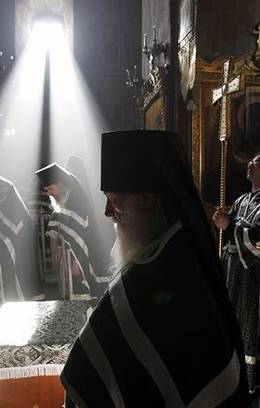Source and copyright: Holy Resurrection Orthodox Church
 At every Orthodox Liturgy, just before Holy Communion we all say with St. Peter and St. Paul: I believe, O Lord, and I confess that Thou art truly the Christ, the Son of the living God, who camest into the world to save sinners, of whom I am first… (St. Matthew 16:16, 1 Timothy 1:15). People are often puzzled by the words, ‘I am first’ – someone asked, What about Hitler? Such reasoning means we are thinking of sin in terms of breaking laws, which would mean we could measure and compare it: I broke so many laws, but Hitler many more. We may reduce forgiveness to a system: “I committed this many sins, but Christ has a program for that; He has paid my debt. He forgives sins if we meet certain requirements. I know what I must do to be forgiven: believe, repent, confess. I have met the requirements so I am forgiven.”
At every Orthodox Liturgy, just before Holy Communion we all say with St. Peter and St. Paul: I believe, O Lord, and I confess that Thou art truly the Christ, the Son of the living God, who camest into the world to save sinners, of whom I am first… (St. Matthew 16:16, 1 Timothy 1:15). People are often puzzled by the words, ‘I am first’ – someone asked, What about Hitler? Such reasoning means we are thinking of sin in terms of breaking laws, which would mean we could measure and compare it: I broke so many laws, but Hitler many more. We may reduce forgiveness to a system: “I committed this many sins, but Christ has a program for that; He has paid my debt. He forgives sins if we meet certain requirements. I know what I must do to be forgiven: believe, repent, confess. I have met the requirements so I am forgiven.”
But sin is not the breaking of a law; it is the breaking of a relationship. God has created each of us a unique person whom He loves in a unique way. Each of us has a unique relationship with God and a unique way that we are called to share His likeness, and also a unique relationship with the other people in our lives.
All have sinned and come short of the glory of God. (Romans 3:23). Each of us has broken and betrayed and failed in these relationships in a unique way, which can’t be compared with what someone else has done. Each of us is the ‘first’ to betray the unique relationship each has with the Lord.
Just as our calling and relationship with the Lord is unique, when it is broken the healing of it must also be unique, not part of a system. When we have a broken relationship with some other person we care about, we want the relationship restored, not just ‘forgiven’ in a legal sense. We want the person back in our lives. A form letter from the person saying he forgives us would not satisfy us.
Christ came into the world to save sinners, precisely to restore His relationship to them. He singles them out to call them to Himself.
St. Paul had a special reason to call himself the first of sinners. He had persecuted the Church. When the first Christian martyr, St. Stephen, was stoned to death, the witnesses laid down their clothes at a young man’s feet, whose name was Saul [Paul]… And Saul was consenting unto his death… he made havock of the church, entering into every house, and haling men and women committed them to prison. (Acts 7:58 ff). But St. Paul also had a special experience of Christ on the road to Damascus. He heard a voice saying unto him, Saul, Saul, why persecutes thou me? And he said, Who art thou,Lord? And the Lord said, I am Jesus whom thou persecutest. (Acts 9:4 ff).
St. Peter denied the Lord three times the night of His betrayal, saying, I know not the man. (St.Matthew 26:74) But the Lord has the Angel say to the women at the tomb, go tell his disciples and Peter (St. Mark 16:7) – He wants Peter to know He is still counted with the disciples. Later He asks Peter three times, lovest thou me? This is to give Peter the opportunity to affirm his love for the Lord as many times as he had denied Him. (St. John 21:15 ff)
Our Lord does not forgive because some legal requirement has been met. He does not forgive because it is His ‘policy’ to forgive. He forgives each of us because He freely loves and chooses to forgive each of us. Each time we are forgiven, it is a unique and personal gift of mercy.
Christ promised to be with us always, even unto the end of the world. (St. Matthew 28:20). He promised that where two or three are gathered together in my name, there am I in the midst of them. (St. Matthew 18:20). When we come to Church, it is not to hear words about forgiveness, but to encounter Jesus Christ, to unite ourselves to Him. He Himself is our forgiveness, our healing, our reconciliation; it is in union with Him that we find our reconciliation with God and with each other.













